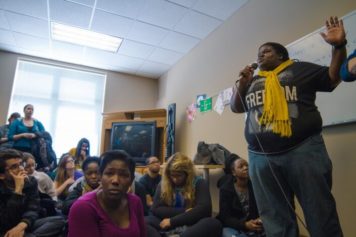
Even their party’s most progressive voices seem to be ignorant of the fact or afraid to say that the rise in populist movements that voice the anger of different groups of Americans are a widespread outcry against not only the decades of poor governance of capitalism, but also the direct result of the unavoidable flaws within a capitalist society. The flaws of exploiting marginalized communities in our society in order to enrich elites is not only the original sin of capitalism, but it also is the sin whose fruits we are finally beginning to reap.
There are entire segments of society in America that have for generations been left holding the bag for the wealthy. Here are some of them given in a roughly chronological order of their abuse relative to the birth of capitalism:
It is appropriate to start with slavery, as the labor stolen from slaves effectively created capitalism (which may be defined as the pursuit of profit with disregard for the means used to arrive at the end result). It is no surprise (to me, at least) that capitalism has failed to provide for this community. The descendants of slaves still live under state oppression and are disproportionately poor in a way that is much more isolating than that faced by the poor of other groups. And still the punditry — the enablers of the capitalist elite — react with surprise at the resistance against state-sponsored physical, societal and economic oppression. Still, they rise. Despite police oppression and political repression, they rise. They rise to resist and to remind us that Black Lives Matter, too.
Another group — or another conglomeration of groups — that is feeling the brunt of capitalist oppression is the Native Americans. The theft of their lands — which led to the disrespect for and destruction of their cultures — was necessary to make room for America’s racist, capitalist expansion. Now (again, unsurprisingly), we see the continuation of this disrespect with the DAPL pipeline running dangerously close to their land, in addition to the water supply for millions of people and countless acres of farmland (a glaring example of blatant capitalist disregard). We also see another commonplace example of the unjustifiable abuse by state authorities (the profit protectors of the one percent) against peaceful protesters, in this case, mainly Native water protectors, at the Standing Rock rebellion.
It should be noted that we should not be developing anymore infrastructure for fossil fuels anywhere, but rather diminishing fossil fuel transportation and production. It also is worth noting that white, armed protesters who threatened the government, not business interests, at the Malheur Refuge occupation in Oregon early in 2016 were cleared of all charges; their threat was real and their cause was not nearly as noble.
Then, progressing to the turn of the 20th century, we see the rampant, grotesque labor abuses (which pale in comparison to slavery) in the first few decades of industrialized capitalism (child labor, no minimum wage, wage theft, 84-hour work weeks, sexual assault, etc.). Although things did improve significantly due to the militant labor movement, now that unions have declined, so have wages, along with workers’ rights and protections against abuse. Simultaneously, the gap of wealth inequality has grown to critical mass as the bourgeoisie has continued to enrich itself at the expense of everyday Americans.
And again, we now see the rise of populist movements whose origins are founded in economic stress, starting with the Tea Party, then Occupy Wall Street, followed by the Fight for $15 and the Donald Trump and Bernie Sanders campaigns. All of which, despite early and growing successes, were written off as unfeasible and ridiculous by the enablers of the elites, the punditry class. They were surprised at the rise of populism and of the disdain for elite institutions. Really? It must be noted that the Donald Trump victory is not simply the product of bigotry but of exploited and manipulated economic anxiety and frustration toward (rightfully so) out-of-touch elites.
These blue-collar communities are the same ones always used to achieve power. (Think: how many times have you heard a candidate say “…who power America” or “…who feed America”?) Yet, what have these communities ever received in return? Exported manufacturing jobs, the absence of investment to help transition to a clean energy economy, shady foreclosure practices and immoral land grabs of family farms are all. (Another example of using the vulnerable to achieve power.)
It is no surprise at all that the state (the facilitator and now the puppet of the capitalist system) has failed to provide for nor defend these communities. After all, their exploitation is in the interest of the billionaire class. For it is by the exploitation of laborers and farmers that capitalism has continued to grow after slavery. With the failures of elite institutions that serve the power culture to provide for everyday people, neither is it a surprise that Trump rose enough in popularity to win the presidency.
When talking of “growth” at the expense of others, we must also consider the exploitation and destruction of our planet. The most blatant way of exploiting humanity would probably be to use up all of its resources and destroy its environment as its population continues to grow rapidly. Of course, exploitation in the name of wealth creation is not a new theme in human history but rather a central theme of capitalism.
With this in mind, the election of a businessman who has not only made a fortune, a lifestyle and now a political career out of stiffing and exploiting the less powerful but also who does not believe in climate change to the office of the most powerful person in the world is, perhaps, again largely unsurprising for a capitalist society.
Now, during the autopsy of the left, we must start to formulate and actualize a plan for a counter-swing on the local level in 2017 and on the state level in 2018. However, this cannot be achieved by embracing the capitalist system that has led to the rise of fascism in the U.S. and abroad. This counter-swing will only be achieved if more candidates and everyday people, regardless of their party affiliations, begin to recognize the need to fight for socialism.
More immediately, progressive politicians, candidates and all progressive movements must mobilize rapidly to protect the rights, property and persons of all communities. After centuries of capitalist oppression, it is imperative that all progressive and oppressed groups come together to defend all communities that are threatened by Trump’s presidency and Republican control of both Houses and the Supreme Court. For this reason, there must be additional massive rallies on Washington D.C. in order to not only vocalize a strong opposition movement, but also to organize and articulate a unified, progressive populist vision for this country.
This “People’s Congress” must be organized by leaders of every progressive cause and done in the pursuit of defending and winning progressive gains and building a populist Rainbow Revolution to fight for true progressive politics – meaning an end to capitalist oppression and right-wing division. I propose a People’s Congress to organize a general People’s Agenda, a People’s Declaration of sorts. After which, there should be a yearly session for two weeks to mobilize voters and activists.
This Congress shall be made up of the most progressive politicians, lawyers, lobbyists, advocates and activists for every progressive cause in and having to do with the United States of America. Through creating a national collective platform for progressive politics, we will change the United States for the better in spite of the Trump victory this November, provide a necessary beacon of hope for those disillusioned with our country’s political failure and usher in decades of progress through a unified voice against continued oppression.
—————————————————————————————————Daniel Radford is an activist from North Idaho who was too young to vote in the 2016 election. He began organizing in 2015 by registering voters and helping to hold rallies for Bernie Sanders when he was 16. He is currently on youth exchange in Chile and will return to study International Relations and modern languages at Emory University this fall. Although he has been out of the country for the past seven or so months, he eagerly looks forward to participating in the resistance movement any way he can.


